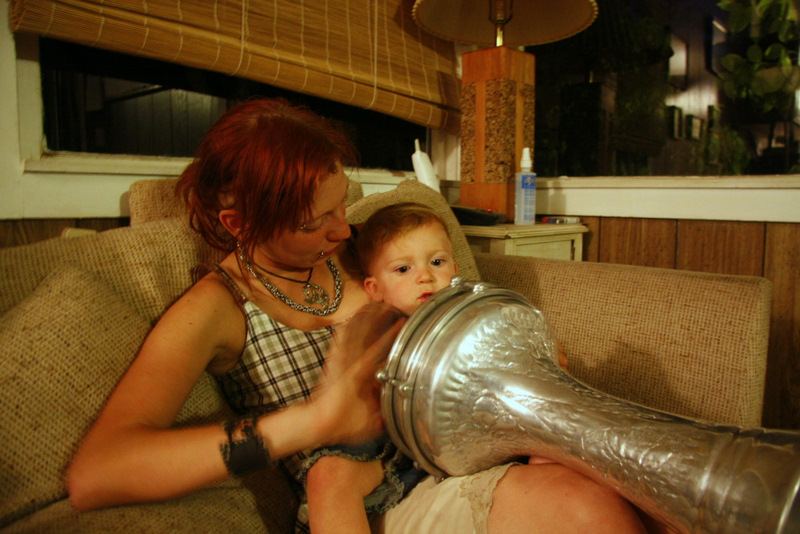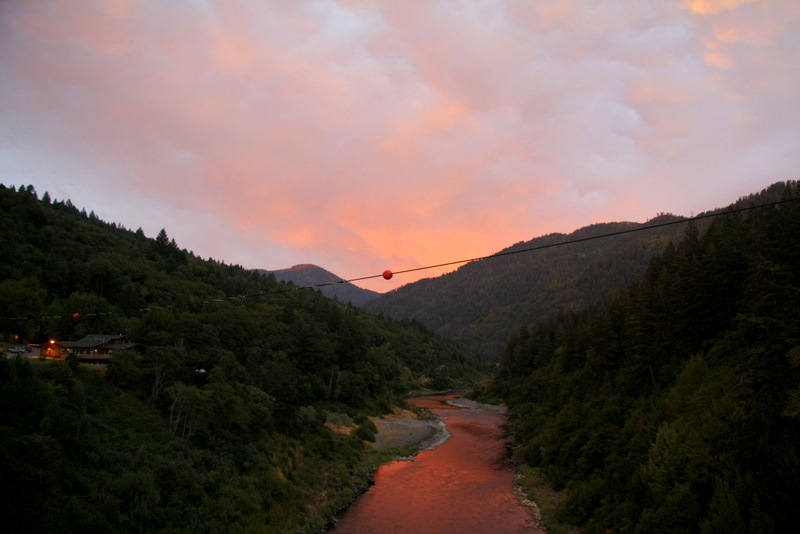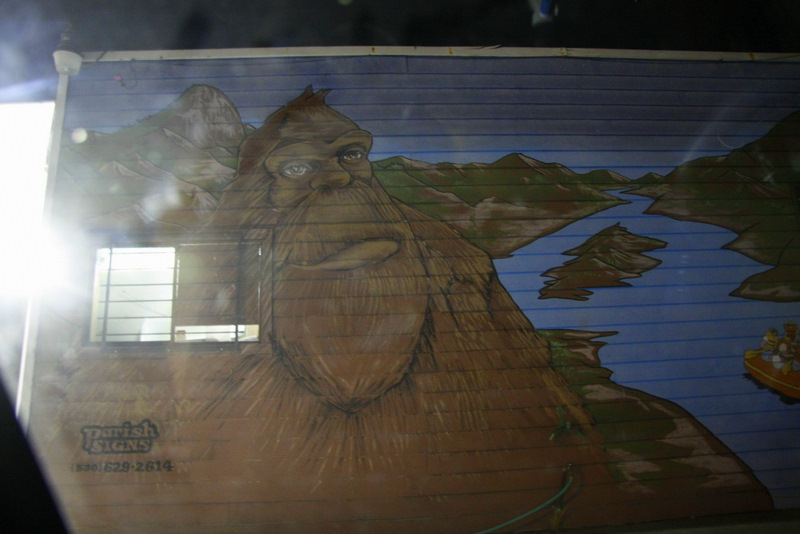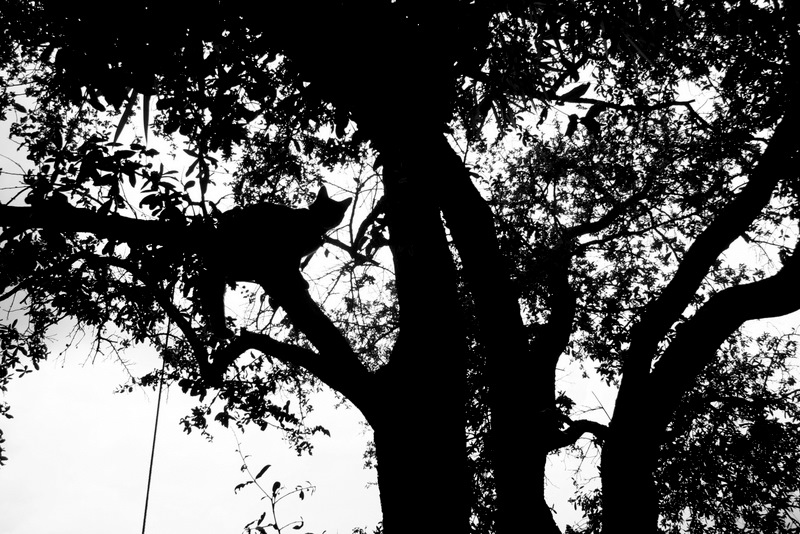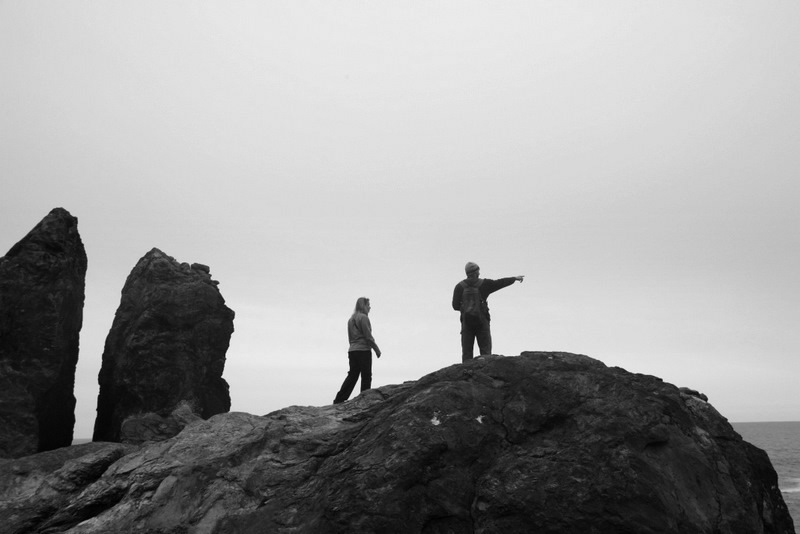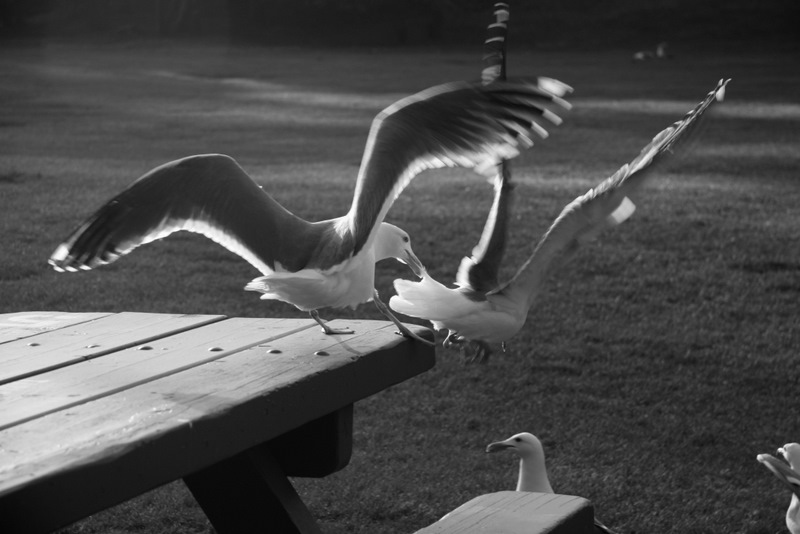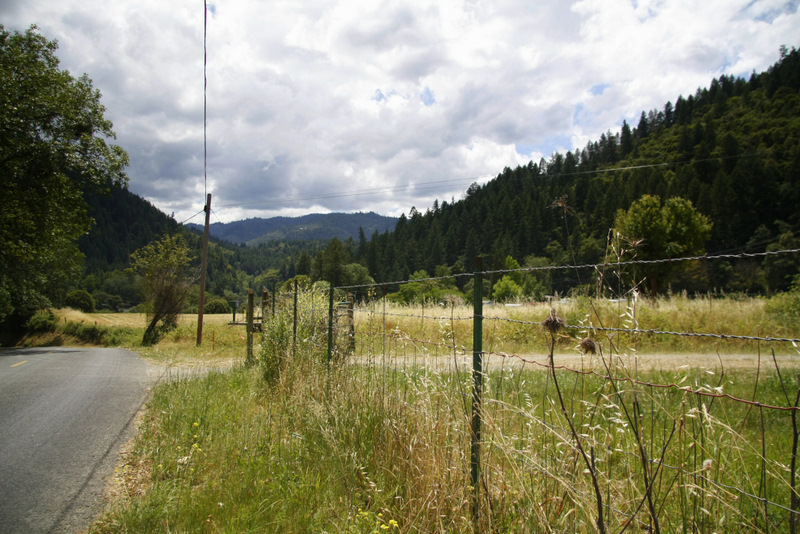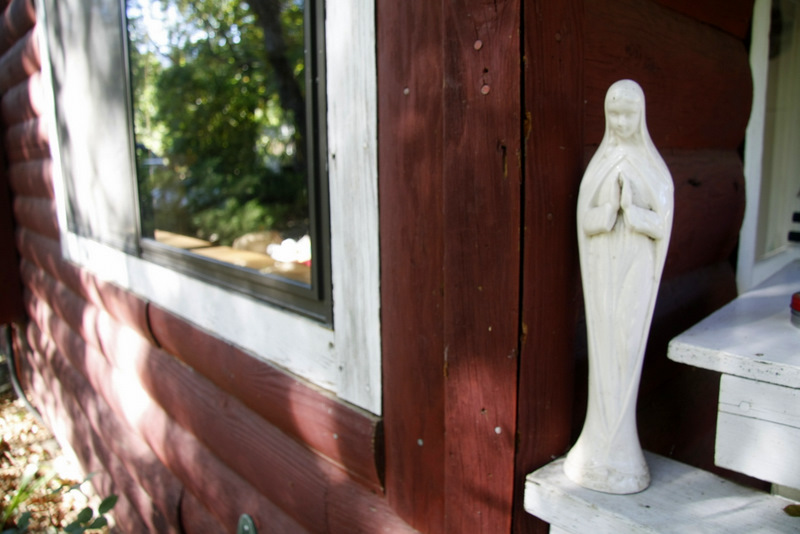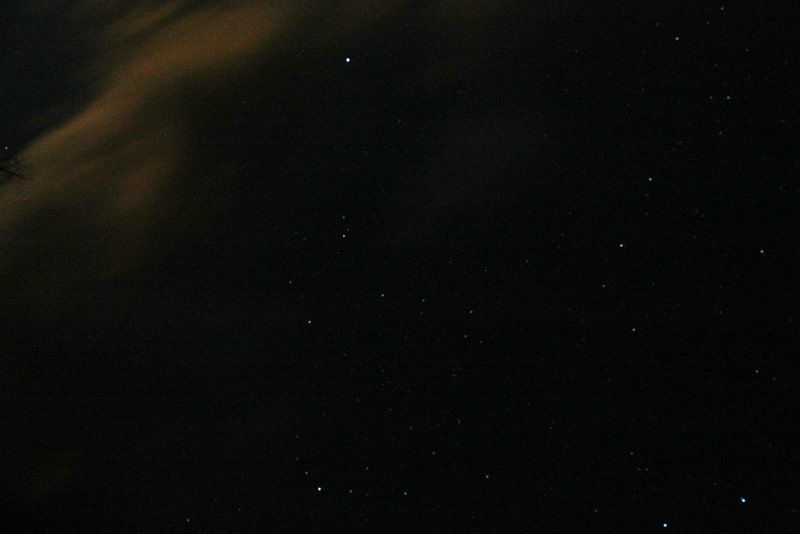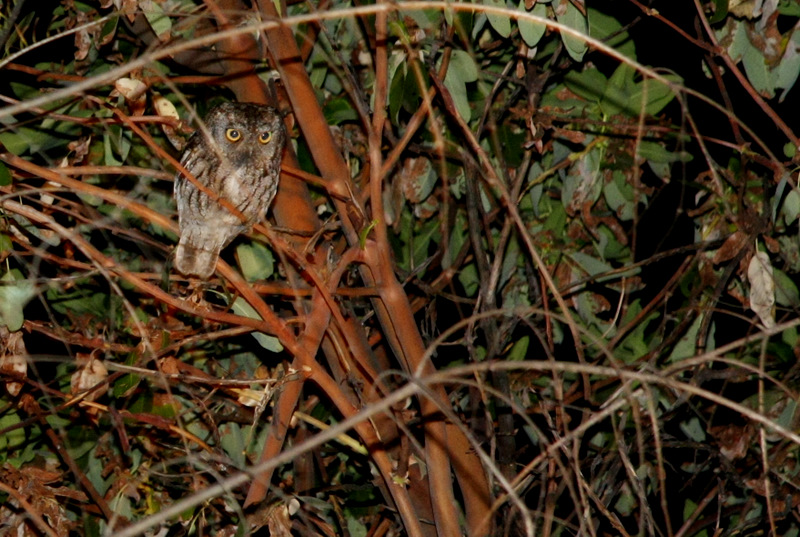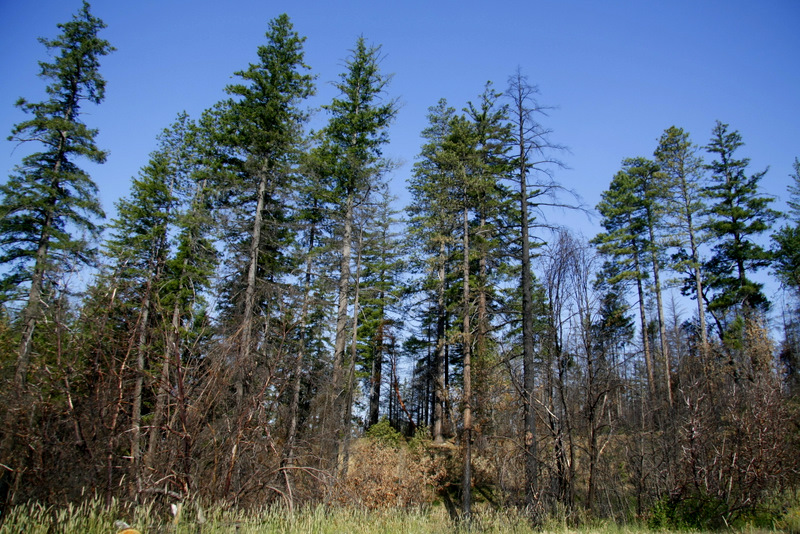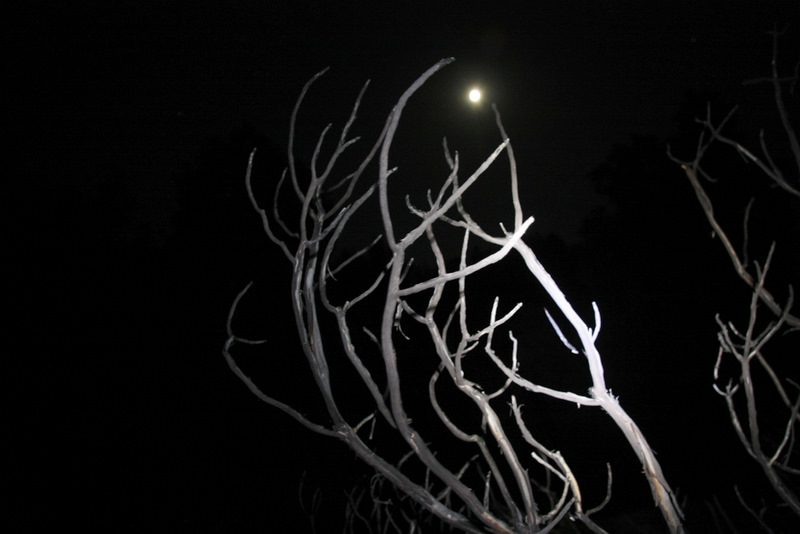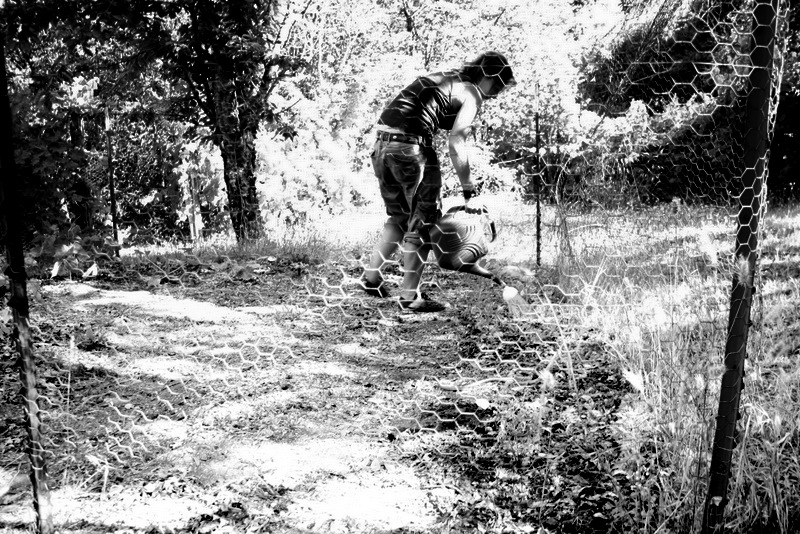The girl tapped her manicured maraschino cherry fingernails on the shopping cart handle as she scrutinized the bagged lettuces. She had a dainty structure: short legs, railroad track hips, childlike hands, and a lipless mouth. Her hair was tied up in a chaotic ponytail, the sixth in series that failed to suit her definition of the “grocery-store level” of hair disarray.
A tall, sinewy man stood in front of the tomatoes, his eyes concealed in the shadows of a sand-colored fedora. The hat was garnished with a paltry red feather, so as to hint it was not passed down from grandfather to father to son, but bought at a trendy Haight street boutique, and made in China. The grin on his face broadcasted a poised demeanor and his long-sleeve, rolled up, thrift store purchased dress shirt hung off his shoulders in a relaxed fashion. She drove her cart past him like a mosquito hovering over human flesh. Her eyes buzzed over him; her hips swayed coarsely from side to side. First it was a pepper that so fittingly danced away from her memory, then a cucumber, then an artichoke.
Standing on the other side of the produce section she schemed her own reality. She would stroll over to the tomatoes, grab one and feign its accidental plummet to the linoleum grocery store floor. The man would scurry after the tomato to retrieve it. While he held the red fruit in the palm of his masculine hand, their eyes would awkwardly flutter across each other’s, and thus, give birth to a lingering sexual silence. And then he would say, “Don’t I know you from somewhere?” And a life full of love and companionship would ensue.
The girl reached out in front of the man, her fingernails ghosts hovering over the tomatoes. She selected a tomato below another in a precarious position, and down it went tumbling like tumble weed across the desert of a floor. It stopped at the feet of a knurled old woman who was in the process of searching for an immaculate head of white cabbage; a head of cabbage she would boil in her lonely 1950’s style kitchen with carrots, celery and onions; cabbage soup she would eat sitting at her boundless mahogany dinning room table, while thinking of youth, love, and exquisite pain (the three often originating from the same events).
The old woman bent over holding her arthritis-ridden back, picked up the tomato resting on the tip of her white orthopedic shoes, and handed it to the girl as she thought to herself, “Oh the joy of still being able to bend over.”
“Oh her yah go sweetie. You betcha those nails can make pickin’ up a tomato a bit of a pickle!” The old woman continued cackling at her vegetable pun through her worn smoker’s throat as the girl turned around and watched her fantasy cross the produce section.
The girl left the store without tomatoes. She didn’t even like tomatoes, with their furry and slimy seeds that resembled a thousand tiny babies growing in unison within her food. But, the girl did like fantasies. They defined her.
The girl was employed as a secretary by a Christian doctor in Berkeley that believed abstinence was obligatory behavior until marriage, and even then, sex was only a manner in which to procreate. He often openly preached his old-fashioned beliefs to the fledgling college students that entered his office for STD testing and free condoms, and to his employees, many of them who were not, in fact, getting laid. Thus, the incessant Godly advice to his staff came only as a reminder that they were not worthy of condoms or sexually transmitted diseases, however much both of those things were not coveted.
The girl wore pencil skirts to work that clung to her waist, and accentuated her shapeless body. Her hair was a dull brown color but she always found some colorful headband or earrings to draw one’s attention away from her underlying drabness.
At work, she fantasized about being discovered. Among the youthful students, there were thirty-something businessmen that occasioned the doctor’s office. In her whimsical mind, a businessman would open the bell-laden office door, walk up to the counter, sign in, and before retiring to the row of linked waiting room chairs to sit tediously for over an hour, he would look up at her, circle her face with his eyes, and tell her she was model material. He would complement her on her high cheekbones, hand her his card, and tell her if she ever wanted to walk the runway instead of the doctor’s office hallways, she should contact him. The card would read something along the lines of “Trent Bobby, professional photographer, Vogue magazine.”
Today was her day. Everyday was her day, but today was her day. She felt it vibrating in the air, glistening on the shiny pastel waiting room wallpaper, and loitering outside on the sidewalk with the cool winter air. But time passed and only furrowed relics of decades past, and markedly rotund pregnant women paraded the office hallways that day.
It was five o’clock and her faith was beginning to drift away with the salmon-colored winter sun. The office closed at six o’clock. Rainer Summers was the last appointment. He was coming in for a check-up on his fractured shoulder blade of six months prior (but really to get a refill for his Oxycodon addiction). And then the door jingled.
A man in a business suit sauntered through the door and to the front desk. Her heart started fluttering as he signed the sheet with a bulbous pen that had etched on the side of it, “Ambien CR-Experience the Difference.” He opened his wallet and pulled out a business card. Her heart began boomeranging off the walls of her chest as if it were a depraved inhabitant of a mental institution bouncing off the padded walls his cell. He looked up at her, paused, tilted his head, smiled disparagingly and asked, “Mosco’s is the sandwich shop next door, right?” Confused, she answered, “Yes,” her scrunched eyes causing hills to form on her brow. The man dropped his business card in the fish bowl next to the office window that read, “Leave Your Card, and Win a Free Lunch for Two at Mosco’s, Home of World’s Biggest and Best Sandwiches!”
The man sat down in the row of connected waiting room chairs and picked up a copy of Sport Fishing magazine. The girl wondered how there could be a magazine entirely devoted to fishing, while the man wondered if he should buy a SeaSucker vacuum-mount rod holder for his new yacht. Shortly after, the nurse opened the waiting room door, “Mr. Summers, Dr. Franklin can see you now.”
The girl waited for the nurse to close the door. She listened, as the small talk grew softer and more distant. When she heard the door of the examination room click-closed, she stuck her hand in the bowl and took out the man’s card, “Rainer Summers, Attorney, Smith and McKinley Associates.” She held the card between her pointer and middle fingers like a cigarette, and smiled as a devious thought inserted itself into her presently bitter mind. She took the card in both hands, ripped it in half, ripped it in half again, and threw it vehemently into the garbage. “Now,” she thought, “he doesn’t have a chance either.”
The next morning was a Saturday. On Saturdays the girl always ran in Golden Gate Park, from the steps of the California Academy of Sciences to the rose garden and back again. Afterwards, she met her friend Katy for lunch in the Haight district. They sat at the window of a fluorescently painted burrito shop, and talked about nothing and everything as she ate a burrito and Katy drank a diet coke. The girl carped of a lack of excitement, how her life had begun to feel like piece of stale gram cracker, bland and without the anticipated crunch. Disregarding her friend’s misery like women disregard the hoots and hisses of construction workers, Katy complained of too much of excitement in her life, “I mean, I can’t continue eating nothing and doing everything. I mean, like I know being a model is super prestigious, and everything, but I can’t like keep taking all this Adderall to suppress my hunger. I mean, like sure, I get to meet all the best people in the world. You know, I met Brad Pitt the other day. He’s not that hot up close.” Katy talked but never listened, as did the girl, so the conversation was as good as two whiny pop songs playing simultaneously.
The girl sat on a bar stool with her back slouching against the burrito shop window. Katy sat erect with her feet coiled around the legs of the stool. Katy was one of the girl’s old college friends. They met at freshman orientation the summer before classes started. Their friendship was convenient, but in no way was it intimate. They were the oil and vinegar of camaraderie; they had similar interests but lacked the ability to thoroughly mix.
The girl had just relocated to San Francisco the previous summer for the job in the doctor’s office. She had attended a small liberal arts college in Ohio and barely obtained a general liberal arts degree. All the girl could really do with her degree was be a secretary, or a schoolteacher in some states. She loathed children, so her only option was to be a secretary. Children were too pure to her, like some vague dream of a real person. They hadn’t materialized yet as individuals, so she didn’t see the point in interacting with them. The funny thing about the girl was that she hadn’t become a real person either. She was still a child, with a basic understanding of existence. Thus, her abhorrence of children was, indirectly, an abhorrence of herself.
Her mother, an acclaimed psychologist who plushly resided in a penthouse apartment on the island of Manhattan, had bore a hole, a boundless cave of a hole, deep into her daughter’s sense of self. She felt that her daughter had an inability to decide, which, thus, she reasoned, lead to ineptness to succeed. What her mother didn’t realize was that her daughter simply lacked heartfelt interests, passions, and driving desires. Except, that is, an interest in envisioning a world where she was the nucleus of humanity, with an idealized man at her side and a train of admirers who regarded her as the picturesque beauty.
Katy continued ranting about the hardship of being a someone, while the girl glided into another fantasy. Katy would bring her to the next gathering of famous people where she would meet directors, actors, actresses, models and photographers. They would all listen with reverence as she spoke about the meaning of life and all existence. She would become their guru and all their best friends. No longer would she be at their feet, begging for approval, or, better yet, in line waiting to beg at their feet, but high above them on a pedestal of popularity. She would be their leader, and the newspapers would call her “the new religion among rich and famous.”
“Katy, when are you going to another one of those parties, like the one where you met Brad Pitt?” asked the girl.
“Oh, I go to them like almost every weekend. There’s always some famous person having some party somewhere. The company I work for always sends me to them for publicity. And I always get to wear some avant-garde dress that some stupid designer made. Next weekend, I think there’s some big thing in LA I’m flying out to go to. I don’t even, like, know what it’s for.”
“Do you think I could go with you? I don’t have any plans this weekend, and I’ve been saving up money, so a flight to LA wouldn’t be a big deal.”
Katy paused awkwardly and rearranged herself on the diner-esque glittery red stool, “Um… I don’t know, I mean it’s not really like anybody can go, you have to know people, you know?”
“Well, I know you, don’t I?” The girl’s eyes were frozen seeds of desperation as she waited for her friend to respond. The world wasn’t working with her. It never had. It never gave her what she felt she deserved. Time and time again it disappointed her. She couldn’t quite understand how life never worked in her favor, which was the root of naivety of existence. “Wasn’t it bound to work out at some point or another, just by chance?” she thought. If she was patient enough, one fantasy will come true. It just has to, by chance.
“Look, I’m really sorry, but it doesn’t really work that way. I wish you could go, but it just wouldn’t make sense for you to go, you know? Your presence wouldn’t do anything for the group, no one would know what to say to you, and you wouldn’t know what to say to them, and that’s why you would get to go in the first place. You have to be able to contribute something, or represent something.”
The girl melted into a puddle of her own sorrows, but her face remained a statue of fake happiness. Her slightly yellowed teeth peeked out from behind her thin, flat lips to force a smile. She tensely clasped her hands together, her tiny fingers nesting in each other, “Oh that’s cool, I just thought I would ask, you know. I thought it couldn’t hurt.” She cleared her throat for the quandary that clung to the oxygen molecules in the air, and looked out the window at pairs upon pairs of young people with dancing feet of happiness, and strands of fluttering weightless hair.
“Well that being said, I think I should go. I have to meet my agent to go over some shoots I have this week. Check ya later girl.” Katy walked out of the burrito shop, and the girl watched her friend’s glossy red leather purse glisten in the sun as she walked down Haight street, through the throngs of stylish San Franciscans that flooded the sidewalk.
The girl woke up Sunday morning with a gallon jug of gloom pressing her into the earth. With the exodus of slumber, her habituated mind commenced its churning of fantastical possibilities. But this Sunday morning proved unlike the others: the thought of some unclaimed reality twisted her stomach into a greasy county fair funnel cake.
She lied in bed, only her eyes peaking out from under a deep crimson down blanket that spanned her queen-sized bed. She listened as the pigeon mother outside her apartment window dutifully shoved insects into the mouths of her defenseless, whimpering chicks. She listened to the click-clacks on the sidewalk and the wide mouths laughs of the liberal San Franciscans, the jovial, water-drought Californians. She listened to the tires of visitor vehicles screaming up and down the precipitous city streets.
“Every new place is a strange place”, she thought, “But my whole life has been strange; from childhood, where shyness overtook me like the plague, to now, where I’m throwing business cards into the garbage resentfully, as if that will change the fate of my own life. Is it just some inevitable truth, that being alive is inherently strange, inherently inadequate, or am I just inadequate? Probably both.
Is this the truth of our existence: to feel as if our lives are not within the grasp of our own hands? Why do we feel this? Because our lives are not in our hands? Because we are nervous little apes, with too much mind and too little instinct to just jump up and catch the currents of existence, and see what happens? Why have I been given this fate of nothingness, and Katy, a fate of popularity and excitement? Who the fuck gets to decide these kinds of things?”
She felt uncomfortable in her own bed; the thought of a lack of control both frightened and infuriated her. She tossed and turned, rearranged her legs and arms, but no matter the endless positions in which she could mold her body, her mind was lost in the alleys of human strangeness, and thus, she felt strange. What used to feel like an infinite well of possibilities, now felt like a black box of seclusion. A series of prospects had become a series of discontents.
She always thought about life like this: that, in the world, there were an infinite number of ways things could turn out, and that becoming aware of this infiniteness allowed her to be driven in the right direction, the happy direction; as if acknowledging the possibility that she could be discovered, or wooed would somehow initiate a chain of events that led to it actually happening.
She was only adept at putting herself in a position where others could act on her thoughts. But only she knew her thoughts. Silly girl. Her life was a fantasy of a fake life; a life she didn’t hold in her hands but one that flew above her in the abyss of idealism. And desire is no substitute for action.
It was six pm. A week had skipped by her like a little girl in pick tails. “Ha ha ha,” laughed Time, “I’m still passing, and you’re still in the same place”. She continued to go to work, but no longer did she think of confident businessmen walking in the door. Work was a monotonous bundle of actions, almost a dance of between her hands and the swivel chair in which she sat; from one end of the counter to the other, filing this, signing that. She didn’t think; she didn’t feel; she didn’t fantasize. She didn’t call Katy, and when she went to grocery store, she made a list and was in and out in under twenty minutes.
On Thursday night, she laid sprawled out on her thrift store corduroy couch watching TV, and becoming more like a zucchini as time passed. While flipping through the flashy consumerism images, she came upon a wildlife show about birds, narrated by none other than David Attenborough. She fell asleep to the soothing English intonation of Mr. Attenborough’s voice and gently from reality to reverie.
In her dreams, she was walking through a field of yellow flowers on the coast of California. She heard the ocean synchronously crashing against the cliffs, like the metronome of the earth. Her footsteps made no sounds. The tall grasses growing where she walked failed to whisper in the wind. All she could hear was the sounds of the waves. The sound of the crashing waves then began to morph into the deep oboe of Mozart’s Serenade for Winds. And all of a sudden, as if they were creating the music, as if the earth was singing to her, a thousand red birds flew up and speckled the sky. As the birds flew higher, she felt herself lifting up slowly, following them. As she flew higher and higher, she could feel the curves of her mouth turning up, and she smiled. In her dreams, she smiled.
She woke up the next morning with a thought. “This is it,” she thought, “I’m going to fly. If nothing else is going to go my way, this will. I’m going to fly.”
Now, it was Sunday. She stood at the top of Mt. Tamalpais, ten miles from San Francisco. Ants of people were crawling around on the ground below her. Her toes hung over the edge of the mountain. She could see San Francisco in the distance and the fog that frequently kept the city company.
Her feet hesitated on the edge, but she knew if she just jumped, she would fly. And then without a thought she jumped.
“How do you like the view?” asked the instructor who attached her to the bright red paraglider that hung above them. “It’s beautiful,” she said.



